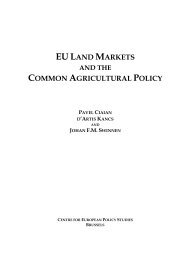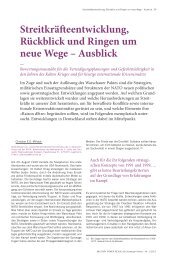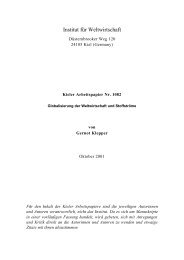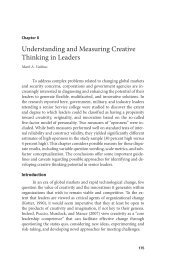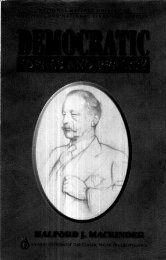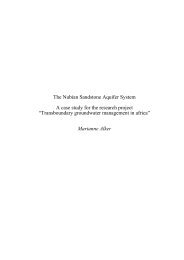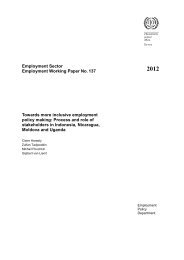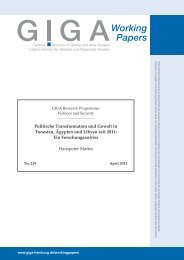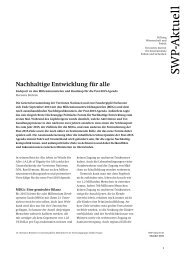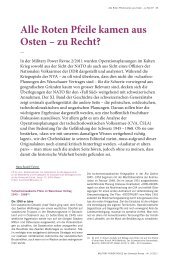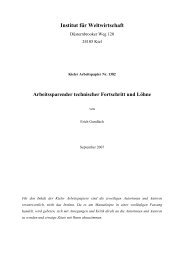Authoritarian Rule and Democracy in Africa: A Theoretical Discourse
Authoritarian Rule and Democracy in Africa: A Theoretical Discourse
Authoritarian Rule and Democracy in Africa: A Theoretical Discourse
You also want an ePaper? Increase the reach of your titles
YUMPU automatically turns print PDFs into web optimized ePapers that Google loves.
themselves at the level of civil society <strong>and</strong> the state? Barr<strong>in</strong>gton Moore has demonstrated thata s<strong>in</strong>gle mode of accumulation, situated with<strong>in</strong> specific historical contexts, can give rise tocomplex patterns of societal development, <strong>and</strong> that it is the latter that is the primarydeterm<strong>in</strong>ant of the political forms of organization (Moore, 1966). Moore’s work shares someaff<strong>in</strong>ity with Gramsci’s, whose major contribution to democratic theory is his retrieval of theconcept of civil society, which Marx had, follow<strong>in</strong>g its dom<strong>in</strong>ant usage at the time, equatedwith material relations. Gramsci situates civil society outside the realm of both materialrelations <strong>and</strong> state power. Yet <strong>in</strong> contradist<strong>in</strong>ction to liberal thought, he sees civil society asthe “soft underbelly of the capitalist system” (Pelczynski, 1988). Civil society offers thepopular classes an opportunity to deny the rul<strong>in</strong>g class hegemony <strong>in</strong> the realm of ideas, values<strong>and</strong> culture, as a basis for the ultimate seizure of power <strong>and</strong> the transformation of capitalistproperty relations <strong>and</strong> the state. The emphasis Gramsci places on civil society has led manycritics to counterpoise his theory of politics to that of Marx (Bobbio, 1988).I argue that the basis for authoritarian rule should be located primarily at the level of materialrelations, which <strong>in</strong> the framework I have sketched, represents the contradictions <strong>in</strong> the formsof accumulation. But the dynamics of authoritarian rule <strong>and</strong> struggles for democratizationdevelop at the level of civil society. Workers organize themselves <strong>in</strong>to unions <strong>and</strong> contest thepower of transnational capital at the work place <strong>and</strong> <strong>in</strong> the wider society. The defence ofseem<strong>in</strong>gly economic <strong>in</strong>terests – wages <strong>and</strong> welfare – draws workers <strong>and</strong> their unions <strong>in</strong>to thearena of democratic politics. They dem<strong>and</strong> for accountability, <strong>in</strong>dependent union organization<strong>and</strong> the right to free expression <strong>and</strong> collective barga<strong>in</strong><strong>in</strong>g, critical for the resolution of wage<strong>and</strong> welfare disputes.Similarly, rent-seek<strong>in</strong>g activities generate their own <strong>in</strong>tractable problems. Firstly, theexpansion of state expenditure creates a public-sector labour force which shares similarconcerns with workers <strong>in</strong> transnational firms for the establishment of <strong>in</strong>stitutionalizedframeworks to promote reasonable work<strong>in</strong>g conditions. Secondly, state capitalism creates alarge middle class of teachers, journalists, lawyers, doctors <strong>and</strong> students, who yearn forprofessional competence <strong>and</strong> autonomy. Thirdly, the state itself may be caught up <strong>in</strong> a “fiscalcrisis” that is structural, hav<strong>in</strong>g to defend both the dem<strong>and</strong>s of accumulation <strong>and</strong> the need forpublic revenue (O’Connor, 1973).Rent-seek<strong>in</strong>g activities may compound the fiscal crisis of the state, <strong>and</strong> may threaten the jobs,<strong>in</strong>comes <strong>and</strong> work<strong>in</strong>g conditions of the groups that owe their livelihood to the public sector.Such groups are likely to be critical, <strong>in</strong> the long run, of corruption, <strong>in</strong>efficiency <strong>and</strong>mismanagement. Rent-seek<strong>in</strong>g methods become illegitimate as the perpetrators of corruption,usually discredited rul<strong>in</strong>g groups <strong>and</strong> private entrepreneurs, come under public censure.Probes on corruption are, <strong>in</strong> fact, very common <strong>in</strong> contemporary <strong>Africa</strong>n politics. They openup possibilities for the democratic allocation of resources.F<strong>in</strong>ally, the politics of patronage at the sphere of petty commodity production can beunderm<strong>in</strong>ed by the very logic of transnational <strong>and</strong> state capitalist penetration of that sector.Two tendencies may be at work here. The authoritarian structures that <strong>in</strong>corporate peasant <strong>and</strong>small-scale producers <strong>in</strong>to the modern economy may be <strong>in</strong> conflict with the dem<strong>and</strong>s forautonomy, free transactions <strong>and</strong> secure welfare that modes of self-employment usuallygenerate. <strong>Africa</strong>n history is replete with peasant revolts aga<strong>in</strong>st unfair prices, arbitrary l<strong>and</strong>acquisitions <strong>and</strong> authoritarian rule. Similarly, the resultant social differentiation <strong>and</strong> sharp<strong>in</strong>equalities <strong>in</strong> resource use may produce an agricultural labour class <strong>and</strong> new rural alliances,possibly l<strong>in</strong>ked to mass urban social movements, <strong>and</strong> pressures for democratization.7



